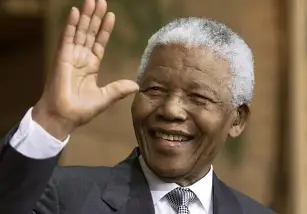Nelson Mandela (1918–2013) was a South African anti-apartheid revolutionary, political leader, and philanthropist who became the first Black president of South Africa from 1994 to 1999. Born in the village of Mvezo in the Eastern Cape, Mandela belonged to the Thembu royal family. He studied law at the University of Fort Hare and the University of Witwatersrand before working as a lawyer in Johannesburg.
Mandela joined the African National Congress (ANC) in 1944, becoming a leader in the fight against the oppressive apartheid regime, which enforced racial segregation. In 1961, he co-founded the militant group *Umkhonto we Sizwe* (Spear of the Nation) to wage a campaign of sabotage against government targets. In 1962, Mandela was arrested, and in 1964 he was sentenced to life imprisonment for plotting to overthrow the government.
Mandela spent 27 years in prison, mostly on Robben Island. His imprisonment garnered global attention, and he became a symbol of the anti-apartheid struggle. Released in 1990, Mandela played a key role in negotiating the end of apartheid, and in 1994, he was elected as South Africa’s first Black president in the country’s first multiracial elections.
During his presidency, Mandela focused on reconciliation, nation-building, and dismantling the legacy of apartheid. He is also remembered for his work in peace and justice and received the Nobel Peace Prize in 1993. After stepping down from politics in 1999, Mandela continued his advocacy work through the Nelson Mandela Foundation, particularly in the areas of HIV/AIDS awareness.
Mandela passed away on December 5, 2013, leaving behind a legacy of justice, equality, and reconciliation【19†source】【20†source】.

